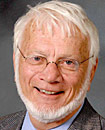Lawrence University graduate Thomas Steitz, whose research on the structure of ribosomes earned him the 2009 Nobel Prize in Chemistry, returns to his alma mater Sunday, June 13 as featured speaker for the college’s 161st commencement. It will be Steitz’ first visit back to his home state since being named a Nobel laureate.
Lawrence is expected to confer 310 bachelor of arts and/or music degrees to 297 seniors from 33 states and 14 countries during graduation ceremonies that begin at 10:30 a.m. on the Main Hall green.
John Dreher, Lee Claflin-Robert S. Ingraham Professor of Philosophy, delivers the address “What’s Good Today” at a baccalaureate service Saturday, June 12 at 11 a.m. in the Lawrence Memorial Chapel. The baccalaureate service and commencement exercise are both free and open to the public.
Four retiring faculty members will be recognized at commencement. s. Robert McMillen Professor of Chemistry Jerrold Lokensgard, Professor of Biology Brad Rence Professor of French Judy Sarnecki and Associate Professor and Director of Technical Services in the library Corrine Wocelka will be awarded honorary master of arts degrees for their combined 129 years of service to Lawrence.
During commencement, President Jill Beck, Lawrence Board of Trustees Chair Harry Jansen Kraemer ’77 and senior Alicia Bones of Omaha, Neb., will join Steitz in addressing the graduates.

Steitz, who grew up in Milwaukee and graduated from Wauwatosa High School in 1958, was named one of three recipients of the Nobel Prize in Chemistry in October and received his award in ceremonies last December in Stockholm, Sweden. He was honored for his decades-long research into the structure and function of ribosomes, which decode messenger RNA into proteins, a function central to life. An understanding of the structural basis of the function of ribosomes provides possibilities for the development of new antibiotics.
Since 1970, Steitz has taught at Yale University, where he is the Sterling Professor of Molecular Biophysics and Biochemistry and professor of chemistry. He also is an investigator for the Howard Hughes Medical Institute.
His address Sunday will be his third appearance on the Lawrence commencement stage. In addition to receiving his own bachelor’s degree with a major in chemistry in 1962, Steitz was awarded an honorary doctorate of science degree in 1981. Lawrence also recognized Steitz with its Lucia R. Briggs Distinguished Achievement Award in 2002.
On Friday, June 11, Lawrence will rename its 10-year-old Science Hall the Thomas A. Steitz Hall of Science in recognition of Steitz’ achievements.
Since winning the Nobel Prize, Steitz has maintained a busy travel schedule. He returned earlier this week from Cambridge University in England where he delivered a lecture to the Medical Research Council. He arrived in England from Erice, Sicily where he was teaching a class. During the past several months, he has attended conferences or delivered lectures in California, Denmark, France, Italy and Switzerland.
The Nobel Prize was just the latest in a long list of awards and honors Steitz has received during his distinguished career. He has been the recipient of the Pfizer Prize from the American Chemical Society, the Lewis S. Rosenstiel Award for distinguished work in basic medical sciences and the Newcomb Cleveland Prize from the American Association for the Advancement of Science.
He also was awarded Japan’s Keio Medical Science Prize in 2006, which honors researchers for outstanding and creative achievements in the fields of medicine and life sciences and the 2007 Gairdner Foundation International Award, which recognizes outstanding discoveries or contributions to medical science.
After Lawrence, Steitz earned a Ph.D. degree in molecular biology and biochemistry from Harvard University, where he worked with 1976 Nobel Prize winner William Lipscomb. Following a postdoctoral year at Harvard, he moved to the Medical Research Council Laboratory of Molecular Biology in Cambridge, England before joining the Yale faculty in 1970.
Steitz is a member of the National Academy of Sciences and the American Academy of Arts and Sciences. He was recently elected a fellow of the American Association for the Advancement of Science.
His wife, Joan Steitz, also is a Sterling Professor of Molecular Biophysics and Biochemistry at Yale. Steitz’ younger brother, Richard, graduated from Lawrence as well, earning a bachelor’s degree with a major in mathematics and physics in 1964.